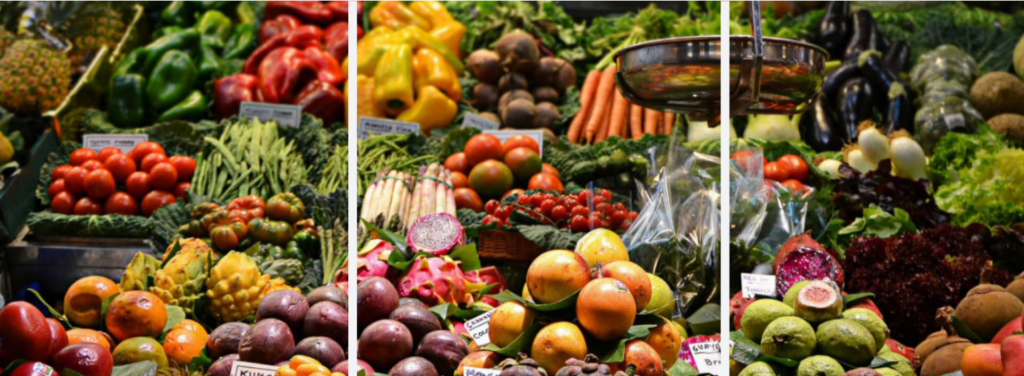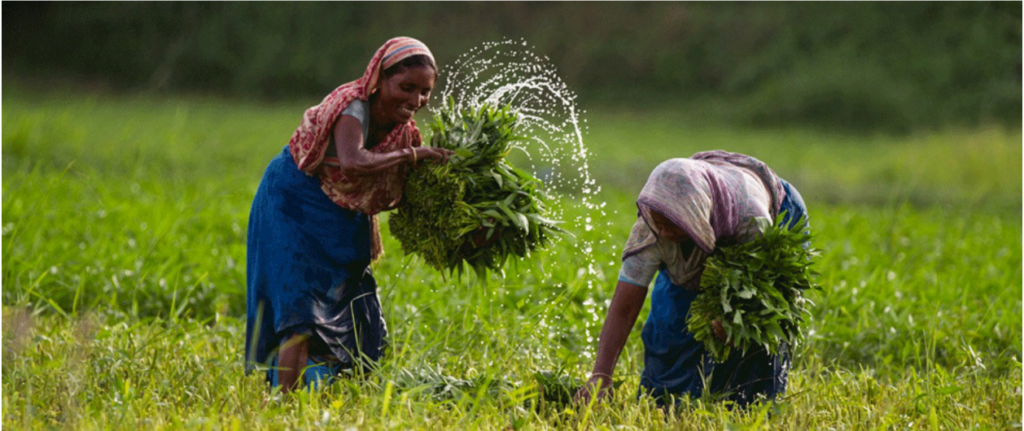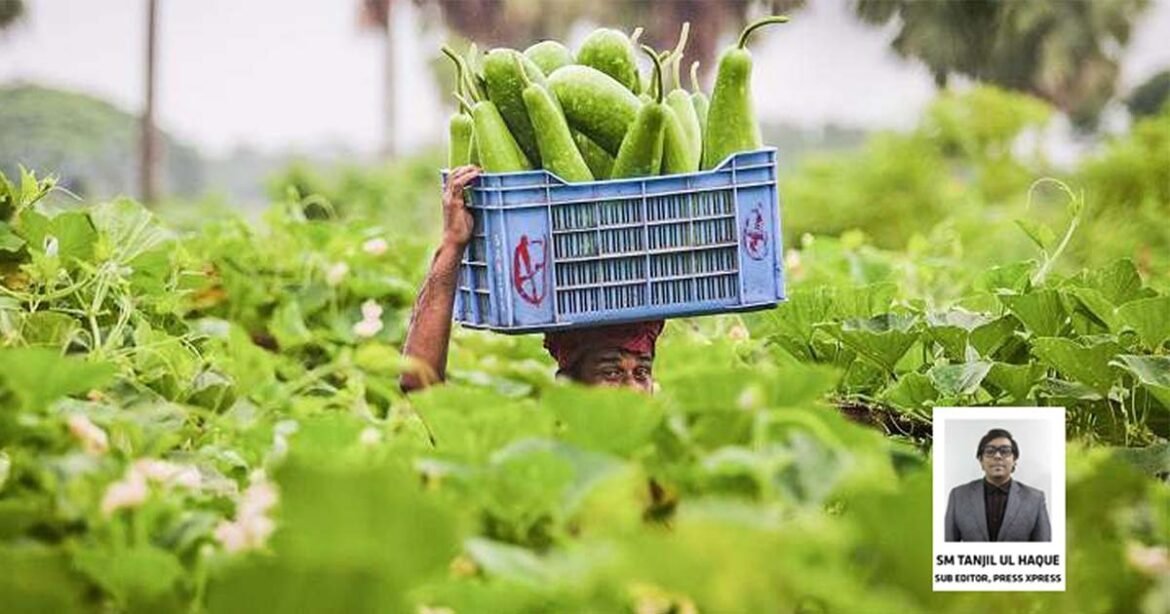Of late, the Food and Agriculture Organisation (FAO) of the United Nations (UN) came up with a note of warning that 45 countries across the world, including Bangladesh, will suffer from acute food shortage in the year 2023. This has fuelled extensive talks and debates over any possible food scarcity in Bangladesh amid a looming food crisis across the globe.
It’s true that the apprehension is there for the ongoing global crisis, caused by firstly the Covid pandemic and then the subsequent Russia-Ukraine war, to deteriorate further this year. But Bangladesh’s prudent Prime Minister Sheikh Hasina took a bold move in the right direction beforehand in this regard when she decided months ago to aware her countrymen of the impending food crisis and asked them to utilise cultivable land, save money and energy.
YOU CAN ALSO READ: RESCUING ANIMALS, BALANCING ECOLOGY
In addition, strong instructions were given by the government on six crucial issues including, increasing food production, reserves and remittances, and foreign investment, to tackle the situation. But the question is whether the country will be able to see off any such crisis? What measures can be taken to prevent advancing famine and what are the challenges and opportunities in this regard? Experts are of the opinion that diversification in agriculture could be a key to face the impending crisis. In addition, they have suggested giving importance to crop diversification, food harvest, and urban farming sooner rather than later.

LOOMING FOOD CRISIS AND BANGLADESH’S ABILITY
After the twin shocks of Covid pandemic and Russia-Ukraine war, the prices of food and fuel marked sharp rise all over the world with Bangladesh being no exception to this. As prices of food products skyrocketed, people are faced with a huge crisis. Experts say that the country’s economy is largely dependent on agriculture, but self-sufficiency in food production remains a relatively grey area. A large portion of food is still import-dependent. As a result, when the conflict breaks out between Russia and Ukraine, two major suppliers of the world’s food supply chain, it had a significant impact on the global food supply and immense food crisis occurred in different countries. Wars and conflicts has disrupted agriculture throughout history. But the nature of this particular war, between two agricultural production powerhouses in the context of globalised agricultural markets, presents never-beforeseen consequences for global agriculture and food security.
As much of Bangladesh’s food demand is dependent on imports, there was a shortfall in meeting the overall food demand of the nation. Some unscrupulous businessmen take the opportunity to raise the prices of food products and form syndicates, where the commoners suffered as usual.
Bangladesh is now the third country in the world in rice production after China and India
However, the Ukraine-Russia war is still ongoing and the conflict is likely to intensify this winter. Consequently, global food crises are likely to persist. The international food agency, World Food Programme (WFP) has been constantly warning of impending global food crises.
According to the regular periodical of the WFP, 45 countries of the world will need additional food imports this year. Among these, the most at risk will be the African countries where food insecurity may also arise. Bangladesh is also under alert, although the risk of food insecurity is not high, but the country will have to import more food in the future according to WFP. In that case, a big question remains whether the country has the ability to spend more on food imports at the time of the current global economic situation and inflation.
In such a situation, the capacity of Bangladesh is in a balanced state. If a wrong decision is taken, a severe food crisis may arise in the country, on the other hand, if the right steps are implemented properly, it is possible to be in a very favourable position in terms of food security. However, the increase in the price of goods in the international market, on the other hand, the dollar crisis has been added to the increase in the value of the dollar locally. As a result, not sufficient amount of dollars are available to import food items. As imports decreased, food prices are increasing on the pretext of supply crisis.
However, the World Bank (WB) said in a recently published report, Bangladesh is not at risk with food security even though the level of food security risk has increased dramatically in almost all countries of the world in the current global context. Export of rice from Bangladesh has been stopped to ensure food security. At present, the food consumption picture of Bangladesh has only rice adequacy. Bangladesh is now the third country in the world in rice production after China and India. There is a big contribution of our farmers for the continuous success of our main product rice production. Along with this, the policy support provided by the government to agricultural scientists is also playing an important role.

Generally, the production of vegetables, paddy and wheat in the country is more in winter. As a result, the government will be relieved of food crisis from previous November to next February. Erie will be cultivated in April, and the supply will increase during then. The crisis will arise from July to October. This requires importation or stockpiling, and obviously diversified production. In the last financial year, the target of food production in the country was set at 3 crore 96 lakh tonnes. The production was 3 crore 87 lakh tons. The production will be less than the target in the current financial year as well. In the current fiscal year, the country has set a target of 4 crore 27 lakh tonnes of rice and wheat production. If the food production is according to the target, there should be more surplus to meet the country’s needs. However, the United States Department of Agriculture has predicted in a report that the production may be slightly lower than the target. As the reason for this, they think, due to increase in the price of fuel for natural calamities, fertilisers, irrigation, the production cost of agriculture will increase. In this, the farmer can reduce the crop cultivation due to lack of proper capacity. 5 million tonnes of food was imported in the last financial year. The target of food import in the current financial year is 47 lakh tonnes. But, a report of the Ministry of Food has also mentioned that there will be no shortage in food supply if the domestic production is strong and imports are ensured in time.
On the other hand, the Prime Minister has warned that not even an inch of land in the country should remain uncultivated. In the meantime, the government has taken initiatives to enhance and strengthen food security by increasing agricultural production and diversification. Farmers will grow crops throughout the year. Apart from this, approval has been given to buy six complete ‘container scanner systems’ for various custom houses and offices in the country. The total cost will be 327 crores. Another 1 lakh 40 thousand metric tonnes of fertiliser is being purchased for the sake of continuing agricultural production. The total cost will be 977 crores. Fertilisers will continue to be supplied to farmers at subsidised rates to strengthen the country’s food security. Fertilizers are being bought at higher prices from the international market and are being sold in cheap countries, so that farmers are encouraged to produce more. Thus, agricultural experts are recommending that diversification is now the key for Bangladesh to meet the upcoming food challenges.
CROP DIVERSIFICATION
Much of Bangladesh’s agriculture is dependent on staple food rice, so experts have suggested diversifying production to increase self sufficiency in agriculture. The soil of Bangladesh is very fertile and many types of food grains can be grown here. All it takes is campaigning, and proper planning. Thus, United Nations (UN) agencies and the government are encouraging smallholders to diversify from rice into a range of high value crops. As worsening conditions, many of which are being exacerbated by climate change, are making rice cultivation even more difficult. To maintain and encourage farmers to produce diversified crops, a project is launched in the country. The project, Smallholder Agriculture Competitiveness Project (SACP), which is implemented by the Ministry of Agriculture, is jointly financed by the government and the International Fund for Agricultural Development (IFAD), with technical assistance from the Food and Agriculture Organisation (FAO) works to increase farmers’ incomes and contribute to food and nutrition security by supporting smallholders become more responsive and competitive in producing high-value crops and diverse, marketing fresh and processed agricultural products.
It is important to enrich the project so that the farmer gets the right inputs, technology and technical advice to get the best benefits from what type of crop on what type of soil. Also, market research information must be provided to farmers through this. So that he understands in which season and at what time the demand for food will be more, as a result he will also make more profit. All through hands-on training to help farmers understand the best sowing and harvesting times of the crop, thereby greatly increasing its yield and profitability.
The addition of new crops or cropping systems to agricultural production on a farm is often used as a strategy to achieve climate resilience. Diversification should also aim to increase the range of potential food production and income sources available to farmers. The most commonly observed barriers to crop diversification include limited capital and market development, and inadequate extension support for non-major food crops. In order to eliminate them, it is necessary to give sufficient facilities including providing loans to the farmers who are enthusiastic.
Currently, Bangladesh is also diversifying its agriculture with fruits such as dragon fruit, Rambutan, pear, strawberry and among vegetables beetroot, capsicum, broccoli, maize, lettuce and aloe-vera.
Farmers producing these are benefiting impressively. The food habit of the people of Bangladesh is changing along with the way of shopping. Currently, many people in the city shop through mobile apps. In those apps, any type of product, whether domestic or foreign, is available under one platform. As a result, foreign products are no longer out of reach. So the demand for these diversified products is increasing day by day, as a result, the production is also increasing.
In Bangladesh, the number of farmers profiting from alternative food production continues to grow, and examples of new profitable food crops are increasing. One such fruit is water chestnut. The fruit called water chestnut can open the doors of new possibilities in our agricultural development prosperity. About three thousand years ago, the cultivation of water chestnut began in China. Studies have shown that water chestnut fruit removes the lack of nutrients in the body, helps to control blood pressure, stops blood indigestion, is a special physical energiser and is very useful in fixing the problem of excess labour in women.
Therefore, many have reached the ranks of developing countries by cultivating water chestnuts and eliminating the lack of nutrients. From the last few decades, water chestnuts are also being cultivated in our country. Due to low cost and high profit, its cultivation method gained wide popularity in a short time. If proper planning and research is done, it is possible to produce crops even from abandoned places and set the economic wheels of the country in motion. In addition, along with water crops, the cultivation of rice, jute, cotton, sugarcane, flowers and silkworms should be expanded, fish farming, vegetables, livestock development, increasing soil fertility, seed development and distribution etc. should be played a leading role by the Ministry of Agriculture and related departments of this country, only then will agricultural diversification succeed.
URBAN FARMING CAN HELP
To sustain the production and keep the diversification of agricultural products up and running, and of course, to ensure no cultivable land remains untouched as per the prime minister’s direction, the country should stress on urban farming, more specifically rooftop farming. There are vast lands that remains uncultivated in the urban area of the country. In this case, urban farming should be encouraged. And, encouragement can be bestowed by lending small amount for enterprouners to begin, and by proper publicity. Many land areas have buildings in the urban side, and rooftop of the buildings, thus, can be a viable option for farming. Moreover, FAO has said that the cities of Bangladesh need rooftop agriculture in order to ensure sustainable food and reduce food wastage. Households can reap nutritional and health benefits from rooftop agriculture. Rooftop agriculture also has positive effects on communities and society in general.
They can help people to re-establish a relationship with what they eat. This is a link that has weakened since we started outsourcing our food and relying so much on industrialized production, needs to be rebuild. In a recent survey using images from drones conducted by the Dhaka North City Corporation concluded that only 2% of rooftops in that part of the city had rooftop gardens. The number needs to be increased a lot if the country wants to diversify its agriculture and stay protected from any upcoming food threat. With collective efforts from the government, relevant organisations, and the general public, Bangladesh’s food production capacity can certainly be expanded in a way that fits our needs. Furthermore, if more of our country’s population, city-dwellers in particular, take part in growing fruits and vegetables on their rooftops, it is safe to believe that the food safety, sustainable establishment of food sources, and reduction of food wastage in our country can be achieved sooner.

In fine, Bangladesh’s obvious shortage in the production of agricultural output is a matter of grave concern. But hope lies with the fact that the country is trying its best to overcome the food crisis in the coming years. The government and the enterprises are taking steps to mitigate the issues. To avert a country-wide food crisis, the premier Sheikh Hasina has urged the farmers and compatriots to be aware of the food crisis. But, availability of food is not enough for food security, affordability of food is needed. Such lessons can be learned from the global food crisis of 2008. When the world food crisis hit around 2008, food could not be bought even with increased prices.
Bangladesh also has such experience. International organizations fear that the situation will be worse this time. To avoid the risk, 25 food exporting countries of the world have already stopped food exports. On top of that, there is doubt about the money to import enough food for Bangladesh this time. Foreign exchange reserves have reached such a level that it will not be possible to meet even three months of import expenditure. Lack of foreign exchange or dollar crisis is disrupting essential imports including food, which is very worrying. Opportunities to increase foreign exchange reserves are also decreasing. In the context of the overall economic condition of the country, the production of food grains, fish, curries, vegetables and fruits should be increased. Also, it should be remembered that food products do not mean only rice and wheat, many other items belong to this category. Therefore, diversification in agriculture needs to be created.


